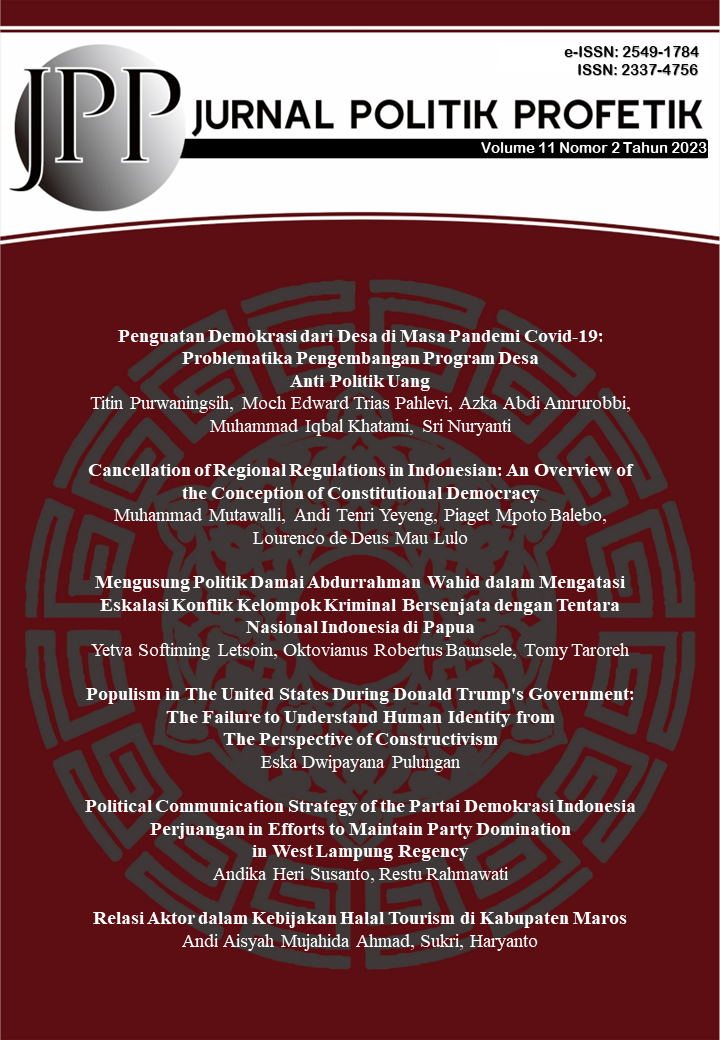Mengusung Politik Damai Abdurrahman Wahid dalam Mengatasi Eskalasi Konflik Kelompok Kriminal Bersenjata dengan Tentara Nasional Indonesia di Papua
Abstract
This paper intends to reflect philosophically as well as to promote the need for a peaceful politics in resolving the conflict of the Armed Criminal Group (KKB) in Papua. This elaboration is reviewed based on Wahid's words and political legacy. The methodology used is the analysis of the text through critical reading that listens to the understanding and concept of peaceful politics according to the spark of Wahid's thought. The author assumes that the prolonged conflict that occurs in Papua, namely the conflict stirred up by the KKB, is one of the biggest threats to the integrity of the Republic of Indonesia. The Indonesian government's decision to upgrade the KKB's status as a terrorist group presupposes the deployment of security forces to hunt down KKB members. However, this has not been the right solution, because in fact the conflict continues to this day. Therefore, the government needs to promote appropriate and relevant solutions so that the disintegration of the nation does not occur. The author finds that humanism and Wahid's ideas about the politics of peace that adhere to the principles of equality and liberation can stem various social and political problems, especially the escalation of conflict in Papua.
Downloads
References
Anugerah, B. (2019). Papua: Mengurai Konflik dan Merumuskan Solusi. Jurnal Kajian Lemhannas RI, 23, 51–65.
Aqil, M. (2020). Nilai-Nilai Humanisme dalam Dialog antar Agama Perspektif Gus Dur. Al-Adyan, 1(1), 52–66.
Chauvel, R. (2005). Constructing Papua Nationalism: History, Etnicity, and Adaptation. East-West Center.
Elisabeth, A., Pamungkas, C., Widjojo, M. S., Rucianawati, & Blegur, S. (2005). Agenda dan Potensi Damai di Papua. LIPI Press.
Fuada, A. R. (2022). Konsep Pendidikan Perdamaian KH Abdurrahman Wahid dalam Perspektif Pendidikan Islam. Universitas Islam Negeri Syarif Hidayatullah Jakarta.
Hidayatulloh, N. S. (2018). Dagelan Politik Gus Dur tahun 1999-2001. Avatara, 6(4).
Indrawan, J. (2021). Mekanisme Resolusi Konflik di ASEAN: ASEAN Sebagai Fasilitator Konflik. Jurnal Ilmiah Hubungan Internasional, 17(2), 172–185. https://doi.org/10.26593/jihi.v17i2.3830.172-185
Kaisupy, D. A., & Maing, S. G. (2021). Proses Negosiasi Konflik Papua: Dialog Jakarta-Papua. Jurnal Ilmu Sosial dan Humaniora, 10(1), 82–98.
Kleingeld, P. (Ed.). (2006). Rethinking the Western Tradition. Yale University Press.
Madung, O. G. (2013). Filsafat Politik: Negara Dalam Bentangan Diskursus Filosofis. Ledalero.
Muh. Rusli. (2015). Pemikiran Keagamaan dan Kebangsaan Gus Dur. Farabi, 12(1), 50–71.
Mulyadi, Prakoso, L. Y., & I Wayan Mudhio. (2021). Konfrontansi Militer Pembebasan Papua Barat dalam Perspektif Strategi Perang Semesta. Jurnal Inovasi Penelitian, 2(1), 265–276.
Mustajab, A. (2014). Kebijakan Politik Gus Durterhadap China Tionghoa Di Indonesia. IN RIGHT Jurnal Agama dan Hak Azazi Manusia Vol. 4, No. 1, November 2014, 4(1), 368. http://ejournal.uin-suka.ac.id/syariah/inright/article/viewFile/1293/1121
Ramdhan, M. A. (2021). Analisis Dimensi Internasional Konflik Papua dalam Model Counterinsurgency (COIN). Jurnal Ilmiah Hubungan Internasional, 17(1), 139–152. https://doi.org/10.26593/jihi.v17i1.3532.139-152
Setiawan, E. (2017). Konsep Teologi Pluralisme Gus Dur Dalam Meretas Keberagaman Di Indonesia. Asketik, 1(1), 57–68. https://doi.org/10.30762/ask.v1i1.411
Soim, M. (2018). Analisis Pemikiran Abdurrachman Wahid tentang PArtai Politik Islam di Indonesia (Nomor 132211050). Universitas Islam Negeri Walisongo Semarang.
Suropati, U. (2019). Solusi Komprehensif Menuju Papua Baru: Penyelesaian Konflik Papua secara Damai, Adil, dan Bermartabat. Jurnal Kajian Lemhannas RI, 37(Jakarta), 73–89. http://jurnal.lemhannas.go.id/index.php/jkl/article/view/52
Tebay, N. (2016). Transformasi Konflik Papua. Jurnal Keagamaan dan Kebudayaan, 12(2), 83–106.
Anugerah, B. (2019). Papua : Mengurai Konflik dan Merumuskan Solusi. Jurnal Kajian Lemhannas RI, 23, 51–65.
Aqil, M. (2020). Nilai-Nilai Humanisme dalam Dialog antar Agama Perspektif Gus Dur. Al-Adyan, 1(1), 52–66.
Chauvel, R. (2005). Constructing Papua Nationalism: History, Etnicity, and Adaptation. East-West Center.
Elisabeth, A., Pamungkas, C., Widjojo, M. S., Rucianawati, & Blegur, S. (2005). Agenda dan Potensi Damai di Papua. LIPI Press.
Fuada, A. R. (2022). Konsep Pendidikan Perdamaian KH Abdurrahman Wahid dalam Perspektif Pendidikan Islam. Universitas Islam Negeri Syarif Hidayatullah Jakarta.
Hidayatulloh, N. S. (2018). Dagelan Politik Gus Dur tahun 1999-2001. Avatara, 6(4).
Indrawan, J. (2021). Mekanisme Resolusi Konflik di ASEAN: ASEAN Sebagai Fasilitator Konflik. Jurnal Ilmiah Hubungan Internasional, 17(2), 172–185. https://doi.org/10.26593/jihi.v17i2.3830.172-185
Kaisupy, D. A., & Maing, S. G. (2021). Proses Negosiasi Konflik Papua: Dialog Jakarta-Papua. Jurnal Ilmu Sosial dan Humaniora, 10(1), 82–98.
Kleingeld, P. (Ed.). (2006). Rethinking the Western Tradition. Yale University Press.
Madung, O. G. (2013). Filsafat Politik: Negara Dalam Bentangan Diskursus Filosofis. Ledalero.
Muh. Rusli. (2015). Pemikiran Keagamaan dan Kebangsaan Gus Dur. Farabi, 12(1), 50–71.
Mulyadi, Prakoso, L. Y., & I Wayan Mudhio. (2021). Konfrontansi Militer Pembebasan Papua Barat dalam Perspektif Strategi Perang Semesta. Jurnal Inovasi Penelitian, 2(1), 265–276.
Mustajab, A. (2014). Kebijakan Politik Gus Durterhadap China Tionghoa Di Indonesia. IN RIGHT Jurnal Agama dan Hak Azazi Manusia Vol. 4, No. 1, November 2014, 4(1), 368. http://ejournal.uin-suka.ac.id/syariah/inright/article/viewFile/1293/1121
Ramdhan, M. A. (2021). Analisis Dimensi Internasional Konflik Papua dalam Model Counterinsurgency (COIN). Jurnal Ilmiah Hubungan Internasional, 17(1), 139–152. https://doi.org/10.26593/jihi.v17i1.3532.139-152
Setiawan, E. (2017). Konsep Teologi Pluralisme Gus Dur Dalam Meretas Keberagaman Di Indonesia. Asketik, 1(1), 57–68. https://doi.org/10.30762/ask.v1i1.411
Soim, M. (2018). Analisis Pemikiran Abdurrachman Wahid tentang PArtai Politik Islam di Indonesia (Nomor 132211050). Universitas Islam Negeri Walisongo Semarang.
Suropati, U. (2019). Solusi Komprehensif Menuju Papua Baru: Penyelesaian Konflik Papua secara Damai, Adil, dan Bermartabat. Jurnal Kajian Lemhannas RI, 37(Jakarta), 73–89. http://jurnal.lemhannas.go.id/index.php/jkl/article/view/52
Tebay, N. (2016). Transformasi Konflik Papua. Jurnal Keagamaan dan Kebudayaan, 12(2), 83–106.
Copyright (c) 2023 Yetva Softiming Letsoin, Oktovianus Robertus Baunsele, Tomy Taroreh

This work is licensed under a Creative Commons Attribution-NonCommercial-ShareAlike 4.0 International License.















